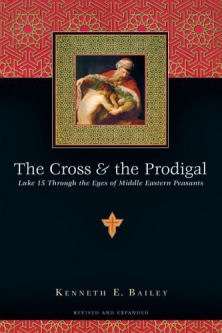
|
Posted August 31, 2005
Book: The Cross and the Prodigal: Luke 15 Through the Eyes of Middle Eastern Peasants Author: Kenneth E. Bailey InterVarsity Press, Downers Grove, IL, pp. 151 An Excerpt from the Jacket:
An Excerpt from the Book: The prodigal must “get out of town” in a hurry. The reason is clear. He moves around the village trying to “sell his birthright for a mess of pottage” as he exchanges his inheritance for a sack of gold coins. The words “gathered all literally mean “turned everything into cash.” The New English Bible translates this verse: “A few days later the younger son turned the whole share into cash and left home for a distant country.” The scorn of the entire community would have been considerable, hence the rush to sell and get out of town. He leaves, and the only thing that follows him is the love of his brokenhearted father. But there is more. First century Jewish custom dictated that if a Jewish boy lost the family inheritance among the Gentiles and dared to return home, the community would break a large pot in front of him and cry out “so-in-so is cut off from his people.” This ceremony was called the Kezazah (literally “the cutting off”). After it was performed, the community would have nothing to do with the wayward person. By selling his inheritance and taking it with him the prodigal takes a huge risk; if he loses that money among the Gentiles, he burns his bridges and has no way to return home. He has no more “rights” to claim and no one will take him in. He travels to a far country. The Greek word for “took his journey” is a colorful term that literally means: “He traveled away from his own people.” Luke uses the word only here. The younger son has indeed left his own people. It is pointless to speculate as to where the “far country” might have been, but we do know that it is among the Gentiles because they ate pork and used pigs as sacrificial animals. The listener or reader remembers that the Kezazah ceremony await him if he loses the money in such a community. In the far country he “squandered his property.” The word “squandered” means “scattered.” It is used for the scattering of an enemy on the field of battle. It also refers to the scattering of a flock of sheep, the scattering of grain in the winnowing process, the scattering of seed in sowing and the wasting of money. There is no record of how he “scattered” his money. The long interpretive tradition that assumed the prodigal spent his resources in immoral ways is built on his older brother’s slanderous remarks. But actually, the older brother knows nothing, and the parable is silent on the matter. All the reader knows is that the money was wasted. Furthermore, the phrase translated “loose living,” has as its basic meaning “spendthrift living.” Aristotle describes a prodigal thus: “A prodigal means a man who has a single evil quality, that of wasting his substance.” Table of Contents: Part One: Commentary on Luke 15 1. Rejoice with me 2. The death wish 3. The face-saving plan 4. The shattering of confrontation 5. The missing climax Part Two: “Two Sons Have I Not” 1. The breakfast table 2. The herd of swine 3. The robe 4. The banquet |
|
